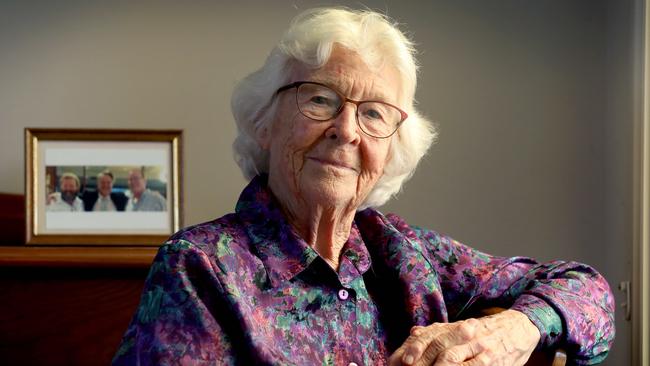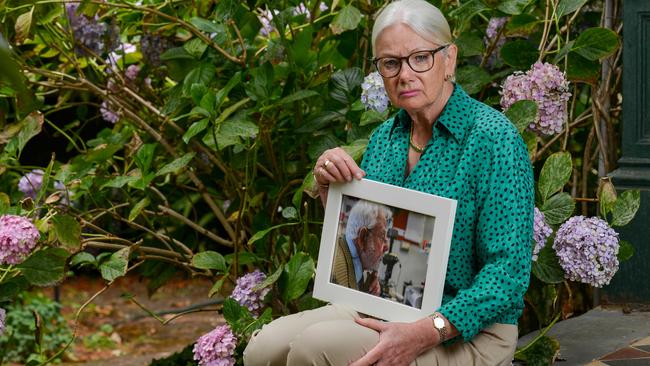Assisted dying, abortion and prostitution law reform – tough decisions face our politicians in 2021. How should they vote?
An Adelaide grandmother is using the last of her life lobbying SA politicians to support assisted dying laws – one of three major reform challenges for 2021.
SA News
Don't miss out on the headlines from SA News. Followed categories will be added to My News.
Beth Mylius wants to die before the excruciating pain from the cancer killing her becomes insufferable, blocking her oesophagus so she cannot eat, drink or say goodbye.
“It is very likely I will die from dehydration,” said the 88-year-old from Magill.
Dying from dehydration and lack of food can take 10 days.
The mother of five sons, two deceased, is “imploring” South Australian politicians to support the state’s 17th attempt at passing assisted dying laws in 25 years.
The Voluntary Assisted Dying Bill is one of three historically significant pieces of law reform facing state MPs and their electorates in 2021.
Mrs Mylius knows she is unlikely to benefit from such laws.
She was diagnosed with inoperable esophageal cancer two years ago and is under palliative care at home.
Her end of life directive includes no medical intervention.
“I want this final journey to be comfortable and I know that the greatest challenge in this will be managing pain that is balanced with my continuing awareness and ability to speak, especially to say goodbye.”
“I’m not scared,” she said.

ASSISTED DYING
Proposed new laws to regulate access to voluntary assisted dying in SA were introduced to parliament by Labor MPs Kyam Maher and Dr Susan Close in December 2020.
Mr Maher said the Voluntary Assisted Dying Bill was modelled on Victorian law which has assisted more than 130 Victorians since 2019 under one of the safest and most protected schemes that exist.
He felt compelled to make a 17th attempt at introducing assisted dying laws after the death of his mother to pancreatic cancer in 2017. He said it was the “most traumatic thing I’ve seen”.
Mr Maher said the time for change was now as SA continued to lag behind other states who have or are introducing such laws.
Under the proposed SA law, access to assisted dying will be given to a person living in SA for at least 12 months, who is aged 18 or more, and is diagnosed with an incurable disease, illness or medical condition that is advanced, progressive and will cause death within weeks or months and is causing suffering that cannot be relieved.
A recent 18-month report into the Victorian laws found loss of autonomy, reduced quality of life, losing control of body functions, and loss of dignity were the most common reasons for requesting voluntary assisted dying.
Lobby groups for and against the Bill have begun contacting local MPs for support.
Dad’s horrible death haunts daughter
Politicians need to be reminded that most people don’t just go to bed and never wake up when they die, says an Adelaide woman who watched her father suffer through multiple brain tumours.
Death, said Mary Lou Simpson, is complicated, long, messy and painful but there are ways to make it more dignified.

It’s a message she wants SA MPs to hear before they vote on proposed laws for voluntary assisted dying, similar to those introduced in Victoria in 2019.
Mrs Simpson’s father, Archie McArthur, died a “horrible” death two months after being diagnosed with multiple, aggressive brain tumours.
“It still upsets me thinking about it,” said Mrs Simpson, a retired schoolteacher in her 60s. Mr McArthur, an internationally renowned SA Museum researcher, suffered excruciating headaches up until his last breath in 2016.
The loss of short-term memory, then speech were the first in a list of cognitive function losses, as he pleaded for his daughter and treating doctor to end his life.
“He was so adamant that he should be able to die and frustrated that he could not,” said Mrs Simpson, founder of the Flinders Rangers Ediacara Foundation.
“Why can’t we copy Victoria?” she said.
“We need to create a law that protects and gives clarity and guidance to doctors and nurses faced with human suffering that is beyond meaningful medical treatment.
“If someone has a terminal illness or deteriorating neurological disorder, who should have the right to tell them they cannot choose how they wish to die?”
ABORTION
The Pregnancy Termination Bill is one of the first pieces of law reform expected to be debated in the Lower House in 2021.
It’s going to be emotionally charged as MPs argue their reasons for support and opposition based on their own personal, cultural and religious beliefs and that of their voters.
There is an election looming in 2022.
The Bill’s author, Attorney-General Vickie Chapman, said it would modernise SA’s abortion laws and ensure abortion was treated as a health issue, not a criminal one, brining SA in line with all other Australian states and territories.
State MPs who have publicly supported the Bill’s decriminalisation of abortion are being threatened with polling booth revolt by anti-abortion lobbyists in SA and from across the border.
“I will be praying you out of work and onto the dole queue,” say the author of a recent email to a politician sighted by the The Advertiser and Sunday Mail.
Labor MP Leon Bignell, who holds the marginal seat of Mawson and supports the Bill in its current form, said: “I don’t really believe that any election victory comes down to one vote or one decision. It comes down to how hard people work for their local area.”
Liberal MP Rachel Sanderson is conducting a survey on the Bill of her marginal electorate of Adelaide. “I will seek further information on the questions that are being raised through my survey and then make an informed decision,” she said.
PROSTITUTION
It’s the oldest trade in the world, but legal reform to modernise it in SA has been rejected 13 times by state politicians.
The last attempt was the closest to decriminalising sex work and was lost by six conscience votes in November 2019.
Concerns raised by various MPs included sex workers soliciting on the street and the locations of brothels in electorates.
Now the fate of a 14th attempt will be decided in the Upper House in early 2021.
SA Greens MLC Tammy Franks, who co-sponsored the 2019 Bill with Ms Chapman, is hoping her Statutes Amendment Repeal of Sex Workers Bill will progress to subcommittee level.
Ms Franks said if passed, new laws would come into force in 2022, giving the government the task to develop a lawful sex industry model.
“In the last debate, some members claimed to support reform but wanted that reform to be Government-led. This Bill is a pathway for how that can happen.”
Under current SA law, operating a brothel attracts a maximum penalty of two years imprisonment, soliciting involves fines of up to $750 and living on the earnings of prostitution attracts a fine of $1250 to $2500 or imprisonment for up to six months.


